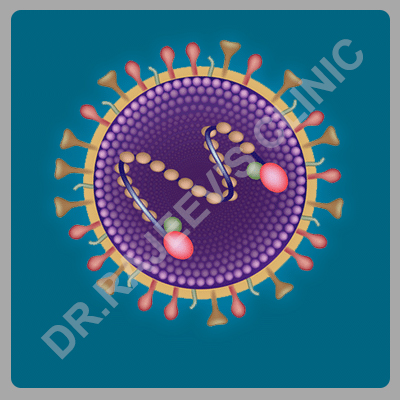

Respiratory syncytial virus (RSV) causes infections of the lungs and respiratory tract. It is so common that most children have been infected with the virus by age 2. Respiratory syncytial virus can also infect adults.
In adults and older, healthy children,RSV symptoms are mild and typically mimic the common cold. Self-care measures are usually all that is needed to relieve any discomfort.
RSV can cause severe infection in some people, including babies 12 months and younger (infants), especially premature infants, older adults, people with heart and lung disease, or anyone with a weak immune system (immunocompromised).
Signs and symptoms of respiratory syncytial virus infection most commonly appear about four to six days after exposure to the virus. In adults and older children, RSV usually causes mild cold-like signs and symptoms. These may include:
RSV infection can spread to the lower respiratory tract, causing pneumonia or bronchiolitis inflammation of the small airway passages entering the lungs. Signs and symptoms may include:
Infants are most severely affected by RSV. Signs and symptoms of severe RSV infection in infants include:
Most children and adults recover in one to two weeks, although some might have repeated wheezing. Severe or life-threatening infection requiring a hospital stay may occur in premature infants or in anyone who has chronic heart or lung problems.
Because RSV and coronavirus disease 2019 (COVID-19) are both types of respiratory viruses, some symptoms of RSV and COVID-19 can be similar. In children, COVID-19 often results in mild symptoms such as fever, runny nose and cough. For adults with COVID-19, symptoms may be more severe and may include trouble breathing.
Having RSV may lower immunity and increase the risk of getting COVID-19 — for kids and adults. And these infections may occur together, which can worsen the severity of COVID-19 illness.
Respiratory syncytial virus enters the body through the eyes, nose or mouth. It spreads easily through the air on infected respiratory droplets.One can become infected if someone with RSV coughs or sneezes near us. The virus also passes to others through direct contact, such as shaking hands.
The virus can live for hours on hard objects such as countertops, crib rails and toys. Touch mouth, nose or eyes after touching a contaminated object and likely to pick up the virus.
An infected person is most contagious during the first week or so after infection. But in infants and those with weakened immunity, the virus may continue to spread even after symptoms go away, for up to four weeks.
By age 2, most children will have been infected with respiratory syncytial virus, but they can get infected by RSV more than once. Children who attend child care centers or who have siblings who attend school are at a higher risk of exposure and reinfection. RSV season when outbreaks tend to occur is the fall to the end of spring.
People at increased risk of severe or sometimes life-threatening RSV infections include:
Complications of respiratory syncytial virus include:
No vaccine exists for respiratory syncytial virus. But these lifestyle habits can help prevent the spread of this infection:
Homeopathy is one of the most popular holistic systems of medicine. The selection of remedy is based upon the theory of individualization and symptoms similarity by using holistic approach. This is the only way through which a state of complete health can be regained by removing all the sign and symptoms from which the patient is suffering. Respiratory syncytial virus (RSV) symptoms treatment that can be selected on the basis of cause, location, sensation, modalities and extension of the complaints. Some important remedies are given below for Respiratory syncytial virus (RSV) symptoms treatment:
Bryonia, Causticum, Pulsatilla, Antimonium tartaricum, Calcarea carbonica, Dulcamara, Hepar sulphuris calcareum, Kali bichromicum, Silicea (also called Silica), Sulphur e.t.c